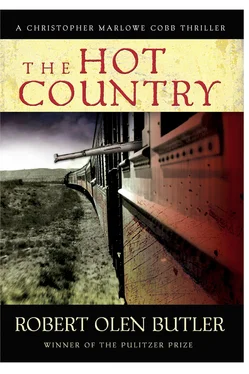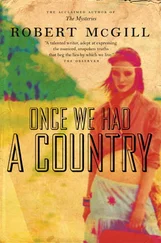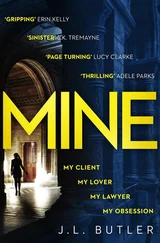The man took his place beside her, and my mother slipped her hand into his arm, and they walked this way, heading for the door. I pulled the brim of my fedora down, but Mother did not look in my direction. She gave the man beside her a glance — so did I, and he was a thick-necked, ruffian-shouldered man with a long-ago-broken nose and tiny eyes — and it was only the one glance she gave him, and after that, she was focused on the door. They passed by and out and I stepped to the door myself and through and onto the sidewalk, and I looked to my right, Up the Line. I didn’t see them. I looked Down the Line, and they were walking together, leaning into each other.
I had only one impulse now. I turned away and headed off in the opposite direction, hustling as fast as I could through the crowd of horny men.
Thirty-six hours later I was arriving at the Illinois Central Railroad Station at the south edge of Grant Park. And an hour after that I was standing in Clyde’s office and I was holding the postcard of Luisa and me and the two dead Mexican snipers and I was stuck on her all over again, just like I was when Bunky snapped me from behind, and Clyde had just lit his cigar and I was feeling hotter standing here ten stories above Michigan Avenue than I had at any time in the past few weeks in the tierra caliente of Mexico.
And he had just said, “So what became of your señorita, do you suppose?”
And I had just answered, “Did I get drunk and send a telegram I don’t remember?”
And he had just responded to that, “Nah. Call it a newsman’s intuition.”
And I had just shrugged and looked away from him.
And now one of Griswold’s endless supply of young stenographers, a redhead in a white shirtwaist and a long black skirt, showed up in Clyde’s door and said, “They’re ready, Mr. Fetter.” She was clearly a little fluttery, as if Clyde and I were very special characters, and since we were not, in her eyes — she’d sassed us both a couple of times each in the last few months — since this fluster was about whoever she’d just left, I was very curious indeed about the meeting.
So we followed her down the hall and into the electric elevator, whose metal doors she yanked open and shut behind us and whose power handle she operated herself, as if she already had the vote and was moving on to any job she’d like to do. We ascended. We followed her again, down the heavily carpeted hall, and she passed a door in the left-hand wall and abruptly stopped and turned and faced us. She nodded us in. We stepped through, into the publisher’s conference room.
At the far end of the table, backdropped by the horizon line of Lake Michigan, sat Paul Maccabee Griswold and a tall, thin man in a bespoke, black, three-piece suit with a gray pinstripe.
Clyde and I didn’t know where to go. Since they were at the end of the table, perhaps we were to sit here, at this end, far away, and face them. But the man in the black suit motioned for us to come down to them. He pointed us to the closest chairs, which were at a right angle to theirs, directing me with a “Mr. Cobb” to the one on the long side of the table, closest to him.
I sat, and Clyde sat beside me. Though the air in this room was smotheringly hot and palpable with barely hidden moisture, the man in the black suit did not appear to have a single drop of sweat on him. He pushed back a bit, angled his chair to face me. Griswold moved himself only minimally, only so he could hold his face on us without getting a crick in the neck. I got the feeling he’d rather have us at the other end of the room and was not happy with the stranger seeming to run the show.
A silence followed. The man held his eyes unwaveringly upon me, large, black eyes that had something wrong in their stare — like the eyes of a prostitute — though that impression may have been an aftereffect of my recent evening in Storyville — and that was wrong, actually, for these eyes, though they were certainly impenetrable, were not like the eyes of anyone who was submitting to anything. He had a bit of Richard Harding Davis about him, a brick of a chin, like a prizefighter who could take a punch, and him making me think of Davis made me consequently think that this was a newspaperman, that Griswold had hired some star editor away from Pulitzer or Hearst and wanted his new man to massage my story.
And Griswold was saying, “You’ve written a surpassingly good story here, Cobb. Three surpassingly good stories.”
The guy in the black suit and I were still looking at each other. He had some of the face lines of a prizefighter, too, of a younger man looking prematurely older because his face was a focal point for aggressive attention. But just a hint of that, really. And his hair was as black as his eyes and Brilliantined into absolute obedience on each side of a right-hand part. He had no mustache, no beard, and the nakedness of his face should have made him seem more open, in a way, but it only emphasized his opacity. And yet, opaque though he was, he was clearly conveying a keen interest in me. I was not sure exactly how. His implacable attention was part of it, certainly. But there was something else.
“In fact,” Griswold said, “your stories are so surpassingly good that much larger issues become involved.”
I looked now at the long-jowled, wide-girthed Griswold, who seemed to be working on expanding his vocabulary with a word-for-the-week. This week: surpassingly. He paused to let the possibility of those larger issues sink in and he pushed his lower lip up and drew the sides of his mouth down, thus putting on his characteristic seriously-silent mask.
I was aware of the prickly mood that was coming over me.
Then he said, “This is the man to speak to those larger issues. Gentlemen, meet James P. Trask, special assistant to the Secretary of State of the United States.”
Trask rose from his chair. “I will stand to shake your hand, Mr. Cobb. To offer all due respect.”
I stood as well, trying to flip the throw bar in my head and switch tracks in this new direction. The Federal Government was why I’d been called back to Chicago. The Federales.
We shook hands, firmly.
“Please,” he then said, pointing to my chair.
I sat. He did too.
He took an envelope from the inside pocket of his suit coat. He handed it to me.
“This is first,” he said.
I opened the envelope, which was sealed in red wax with the American eagle spreading its wings in bas-relief. I unfolded the letter and found the eagle again, in a familiar form: the letterhead of the President of the United States. It was dated two days ago. Written as I was somewhere between Lake Charles and Baton Rouge.
“I saw one of these recently,” I said.
“So I read in your surpassingly good story,” Trask said, smiling slightly. His back was to Griswold and I had no doubt he was asking me to quietly share our mutual assessment of the man. Trask was manufacturing a little bond between us. Instantly he made the smile vanish. “This one is real,” he said.
And so I found that the President of the United States had written this to me:
Dear Mr. Cobb,
I am a great admirer of your work. Not only do you keep the President and his cabinet informed on the status of battlefields around the world, you make a crucial contribution to our democratic society. The free press makes sure all ideas can be expressed, all institutions, all public officials, can be held accountable. It is the freedom upon which all our other freedoms rely.
Sometimes, however, a democratic society might humbly and carefully request a different sort of contribution, one that is rarely required but is, nonetheless, just as crucial.
Читать дальше












